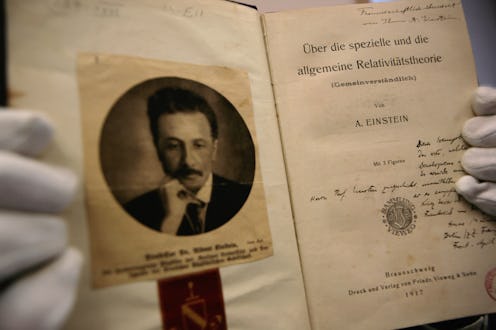Entertainment
'Genius' Looks To Keep Albert Einstein Authentic

Adding to the incredible mythos of Albert Einstein, National Geographic’s first scripted TV series, Genius will focus its 10 episodes on Einstein’s successes and failures. It seems the stars have literally aligned for this project, with Geoffrey Rush and Johnny Flynn playing the famous genius and Ron Howard directing the first episode. On April 25, viewers got another chance to learn about the man who embodies cultural fame for his scientific achievements, personal quirks, and status as a refugee fleeing the Nazis, before becoming an American citizen in 1940. But how accurate is Genius to Einstein's real life?
In a press release, Howard answered this question with a lengthy response, highlighting the importance for accuracy.
I have had a lot of experiences with adapting stories based on real events for movies and TV and it's exciting work ... Having this material to research is great and the entire production office becomes a giant classroom. Everywhere you look there are photographs, drawings and documentary footage and everyone immerses themselves in the world. It is a sense of responsibility and an important level of commitment to the audience and the subjects we are trying to depict. These are important real events and characters from history. This series is meant to capture the truth, both in the literal sense and spirit ... With this series, we can explore more deeply and offer greater insight and details. We still must leave out compelling elements. It is frustrating but we are packing as much as we can while keeping the momentum and drive.
The series does want to deliver a real view of the scientist, while also adding some drama — meaning the scientific discoveries he is most known for will take a backseat to his personal stories. There have been questions about the show's direction with The New York Times mentioning the lack of scientific elements in Genius to their readers: “If you just want to understand his scientific insights, this series is probably not for you. Mr. Howard mentioned in notes distributed to the press that he didn’t understand relativity before making Genius and doesn’t now, either.”
With such a famous figure kicking off Nat Geo’s contribution to an already crowded roster of Peak TV, there is a challenge in moving beyond the biographical and cultural images associated with Einstein (the formulas, the name, the mustache and hair) and creating a well-composed, dramatic series based on fact but that keeps viewers returning for all 10 episodes.
Using inspiration from Walter Isaacson's biography of Albert Einstein, Genius hopes to contribute to a more humanized view of Albert Einstein, one that moves him away from the untouchable great mind and toward a friendlier version for those who are fans, but not scientists. Based on its promos and official website, National Geographic seems very upfront about the entertaining aspect of the scripted series, by including a video gallery of the many sides to Einstein. Fans of the scientific and most popular images of Einstein may find themselves disappointed as the first episode begins with his childhood, but then shifts to showing Einstein as man of many sexual appetites. This image alone is enough to spark controversy in a culture that loves to only tout Einstein’s brilliance as a major contributor to science.
Transitioning Einstein from history book staple and college dorm poster (who can forget that photo of Einstein with his tongue out?) to a compelling television adaptation has the potential to give readers a better view of the scientist aside from Einstein historical factoids.
The show's creators are aware of Einstein’s contributions, but plan to focus more on story, according to Ron Howard an interview with Vanity Fair about Genius, “When you move past his scientific contributions, Albert’s life story — what his youth was like, who his friends were, who his enemies were, his tumultuous love life — is a story people don’t know, which is what attracted me to be on the producing team and to direct the first episode.”
Genius seems to have two challenges: to adapt Isaacson’s book well and to portray Einstein as a multi-dimensional person while explaining his genius for non-scientist viewers. This isn’t anything new for TV, as The Big Bang Theory hires TV fact checkers to work out the science and Mr. Robot uses real hackers to create more accurate scenes. The biggest difference here is the very heavy burden of separating Einstein’s personality from the many different stories and biographies that surround him.
For a man with an extraordinary history, who highlighted the need for an open mind, it is tempting to see him as only a genius. Perhaps National Geographic's Genius will show viewers that a brilliant mind is relative to being human.